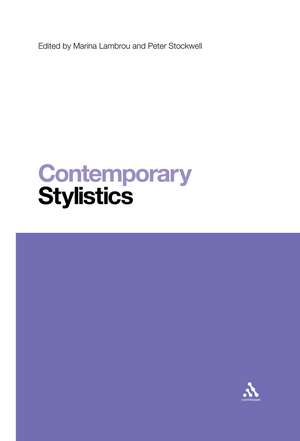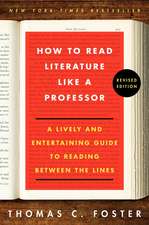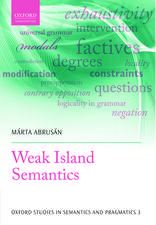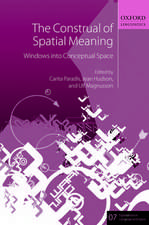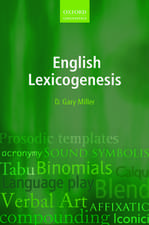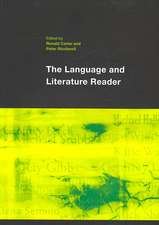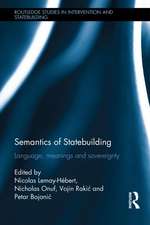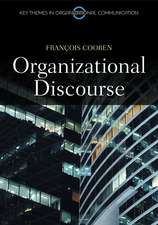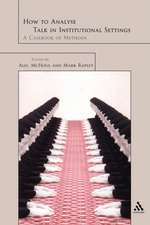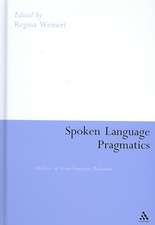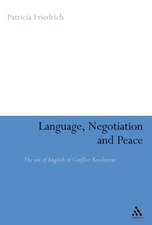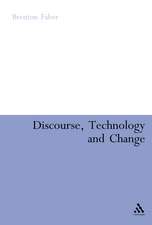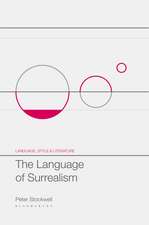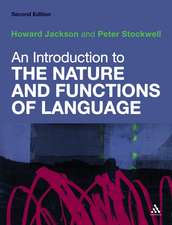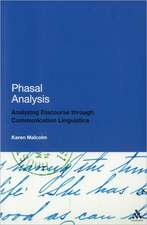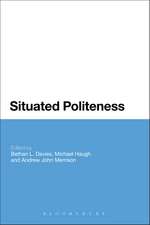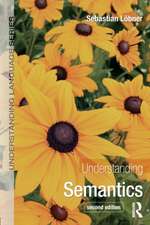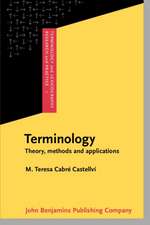Contemporary Stylistics: Contemporary Studies in Linguistics
Editat de Professor Marina Lambrou, Professor Peter Stockwellen Limba Engleză Paperback – 22 feb 2010
| Toate formatele și edițiile | Preț | Express |
|---|---|---|
| Paperback (1) | 218.91 lei 6-8 săpt. | |
| Bloomsbury Publishing – 22 feb 2010 | 218.91 lei 6-8 săpt. | |
| Hardback (1) | 936.41 lei 6-8 săpt. | |
| Bloomsbury Publishing – 13 dec 2007 | 936.41 lei 6-8 săpt. |
Preț: 218.91 lei
Preț vechi: 334.98 lei
-35% Nou
Puncte Express: 328
Preț estimativ în valută:
41.89€ • 44.05$ • 34.61£
41.89€ • 44.05$ • 34.61£
Carte tipărită la comandă
Livrare economică 17 aprilie-01 mai
Preluare comenzi: 021 569.72.76
Specificații
ISBN-13: 9781441183842
ISBN-10: 1441183841
Pagini: 304
Dimensiuni: 168 x 241 x 25 mm
Greutate: 0.54 kg
Editura: Bloomsbury Publishing
Colecția Continuum
Seria Contemporary Studies in Linguistics
Locul publicării:London, United Kingdom
ISBN-10: 1441183841
Pagini: 304
Dimensiuni: 168 x 241 x 25 mm
Greutate: 0.54 kg
Editura: Bloomsbury Publishing
Colecția Continuum
Seria Contemporary Studies in Linguistics
Locul publicării:London, United Kingdom
Caracteristici
A one-volume resource that provides a comprehensive introduction to each area of stylistics, creating a â?~snapshotâ?T of the field.
Cuprins
Introduction: The State of Contemporary Stylistics, Marina Lambrou (University of East London, UK) and Peter Stockwell (University of Nottingham, UK)
I: Stylistics of Prose
1.Woolf's Experiments with Consciousness in Fiction, Violeta Sotirova (University of Nottingham, UK)
Introduced by Lesley Jeffries (University of Huddersfield, UK)
2.A Corpus Stylistic Perspective on Dickens' Great Expectations, Michaela Mahlberg (University of Liverpool, UK)
Introduced by Michael McCarthy (University of Nottingham, UK)
3.The Stylistics of True Crime: Mapping the Minds of Serial Killers, Christiana Gregoriou (University of Leeds, UK)
Introduced by Urszula Clark (Aston University, UK)
4.'Do you want to hear about it?' Exploring Possible Worlds in Michael Joyce's Hyperfiction, afternoon, a story, Alice Bell (Sheffield Hallam, UK)
Introduced by Brian McHale
5.The Effects of Free Indirect Discourse: Empathy Revisited, Joe Bray (University of Sheffield, UK)
Introduced by Geoff Hall (University of Swansea, UK)
6.The Stylistics of Cappuccino Fiction: A Socio-Cognitive Perspective, Rocio Montoro (University of Huddersfield, UK)
Introduced by Imelda Whelehan (De Montfort University, UK)
7.Attribution Theory: Action and Emotion in Dickens and Pynchon, Alan Palmer
Introduced by Elena Semino (University of Lancaster, UK)
8.Bridget Jones's Diary and Feminist Narratology, Ruth Page (Birmingham City University, UK)
Introduced by Sara Mills (Sheffield Hallam University, UK)
9.Schema Poetics and Crossover Fiction,Clare Walsh (De Monfort University, UK)
Introduced by John McRae (University of Nottingham, UK)
10.Deixis, Cognition and the Construction of Viewpoint, Dan McIntyre (University of Huddersfield, UK)
Introduced by Paul Simpson (Queen's University Belfast, Ireland)
II: Stylistics of Poetry
11.'And everyone and I stopped breathing': Familiarity and Ambiguity in the Text-World of 'The Day Lady Died', Joanna Gavins (University of Sheffield, UK)
Introduced by Catherine Emmott (University of Glasgow, Scotland)
12.'Progress is a comfortable disease': Cognition in a Stylistic Analysis of e.e. cummings, Michael Burke (Roosevelt Academy, Middelburg, USA)
Introduced by Peter Stockwell (University of Nottingham, UK)
13.Megametaphorical Mappings and the Landscapes of Canadian Poetry, Ernestine Lahey (Sheffield Hallam University, UK)
Introduced by Peter Verdonk (Emeritus, University of Leeds, UK)
14.Perception and the Lyric: The Emerging Mind of the Poem, Sharon Lattig (City University, New York, USA)
Introduced by Alan Durant (Middlesex University, UK)
15. Deviant Collocation in Literature as a Tool for Vocabulary Expansion, Dany Badran (Notre Dame University, Lebanon)
Introduced by Ron Carter (University of Nottingham, UK)
III:Stylistics of Dialogue and Drama
I: Stylistics of Prose
1.Woolf's Experiments with Consciousness in Fiction, Violeta Sotirova (University of Nottingham, UK)
Introduced by Lesley Jeffries (University of Huddersfield, UK)
2.A Corpus Stylistic Perspective on Dickens' Great Expectations, Michaela Mahlberg (University of Liverpool, UK)
Introduced by Michael McCarthy (University of Nottingham, UK)
3.The Stylistics of True Crime: Mapping the Minds of Serial Killers, Christiana Gregoriou (University of Leeds, UK)
Introduced by Urszula Clark (Aston University, UK)
4.'Do you want to hear about it?' Exploring Possible Worlds in Michael Joyce's Hyperfiction, afternoon, a story, Alice Bell (Sheffield Hallam, UK)
Introduced by Brian McHale
5.The Effects of Free Indirect Discourse: Empathy Revisited, Joe Bray (University of Sheffield, UK)
Introduced by Geoff Hall (University of Swansea, UK)
6.The Stylistics of Cappuccino Fiction: A Socio-Cognitive Perspective, Rocio Montoro (University of Huddersfield, UK)
Introduced by Imelda Whelehan (De Montfort University, UK)
7.Attribution Theory: Action and Emotion in Dickens and Pynchon, Alan Palmer
Introduced by Elena Semino (University of Lancaster, UK)
8.Bridget Jones's Diary and Feminist Narratology, Ruth Page (Birmingham City University, UK)
Introduced by Sara Mills (Sheffield Hallam University, UK)
9.Schema Poetics and Crossover Fiction,Clare Walsh (De Monfort University, UK)
Introduced by John McRae (University of Nottingham, UK)
10.Deixis, Cognition and the Construction of Viewpoint, Dan McIntyre (University of Huddersfield, UK)
Introduced by Paul Simpson (Queen's University Belfast, Ireland)
II: Stylistics of Poetry
11.'And everyone and I stopped breathing': Familiarity and Ambiguity in the Text-World of 'The Day Lady Died', Joanna Gavins (University of Sheffield, UK)
Introduced by Catherine Emmott (University of Glasgow, Scotland)
12.'Progress is a comfortable disease': Cognition in a Stylistic Analysis of e.e. cummings, Michael Burke (Roosevelt Academy, Middelburg, USA)
Introduced by Peter Stockwell (University of Nottingham, UK)
13.Megametaphorical Mappings and the Landscapes of Canadian Poetry, Ernestine Lahey (Sheffield Hallam University, UK)
Introduced by Peter Verdonk (Emeritus, University of Leeds, UK)
14.Perception and the Lyric: The Emerging Mind of the Poem, Sharon Lattig (City University, New York, USA)
Introduced by Alan Durant (Middlesex University, UK)
15. Deviant Collocation in Literature as a Tool for Vocabulary Expansion, Dany Badran (Notre Dame University, Lebanon)
Introduced by Ron Carter (University of Nottingham, UK)
III:Stylistics of Dialogue and Drama
16.Oral Accounts of Personal Experiences: When is a Narrative a Recount?Marina Lambrou (University of East London, UK)
Introduced by David Herman
17.'Never a truer word said in jest': A Pragmastylistic Analysis of Impoliteness as Banter in Henry IV, Part I, Derek Bousfield (University of Huddersfield, UK)
Introduced by Billy Clark (Middlesex University, UK)
18. The Cognitive Rhetoric of Arthur Miller's The Crucible, Craig Hamilton (University of California, USA)
Introduced by Peter Crisp
19. The Stylistics of Drama: The Reign of King Edward III, Beatrix Busse (University of Berne, Switzerland)
Introduced by Monika Fludernik (Albert-Ludwig University, Freiburg)
20.Computer-Assisted Literary Stylistics: The State of the Field, Dawn Archer (University of Central Lancashire, UK)
Introduced by Jonathan Culpeper (University of Lancaster, UK)
References
17.'Never a truer word said in jest': A Pragmastylistic Analysis of Impoliteness as Banter in Henry IV, Part I, Derek Bousfield (University of Huddersfield, UK)
Introduced by Billy Clark (Middlesex University, UK)
18. The Cognitive Rhetoric of Arthur Miller's The Crucible, Craig Hamilton (University of California, USA)
Introduced by Peter Crisp
19. The Stylistics of Drama: The Reign of King Edward III, Beatrix Busse (University of Berne, Switzerland)
Introduced by Monika Fludernik (Albert-Ludwig University, Freiburg)
20.Computer-Assisted Literary Stylistics: The State of the Field, Dawn Archer (University of Central Lancashire, UK)
Introduced by Jonathan Culpeper (University of Lancaster, UK)
References
Index
Recenzii
'This is a lively selection of contributions, on a wide range of texts (fiction, plays, and poetry) and drawing on a remarkable diversity of theoretical commitments, from twenty of the most talented newer or younger academics engaged in language-oriented analyses of literature. Each essay in turn is usefully introduced by an established academic in the same field. This format, in which an older author sponsors a newer one while being given the chance to point out differences of view, lends both a gracious formality and a spirit of collegial dialogism to the collection. For anyone who wants to see what issues and arguments fascinate and inspire some of the exciting new generation of stylisticians, this is an excellent place to look.'
"The range of texts analysed is excellent, from Dickens to Bridget Jones, and unlike many edited collections in stylistics, the essays do not just analyse novels or poetry; there is a good spread here across literary genres. The chapters give a real insight into the richness of approaches available today within stylistics research; this book should be required reading on many literary linguistics courses."
This project is successful because of several qualities and strengths [including]... the editors' scholarly expertise and proficient management... the cohesive internal structure of the individually-authored chapters... the broadness of genre range and the richness of texts analysed.
"The range of texts analysed is excellent, from Dickens to Bridget Jones, and unlike many edited collections in stylistics, the essays do not just analyse novels or poetry; there is a good spread here across literary genres. The chapters give a real insight into the richness of approaches available today within stylistics research; this book should be required reading on many literary linguistics courses."
This project is successful because of several qualities and strengths [including]... the editors' scholarly expertise and proficient management... the cohesive internal structure of the individually-authored chapters... the broadness of genre range and the richness of texts analysed.
